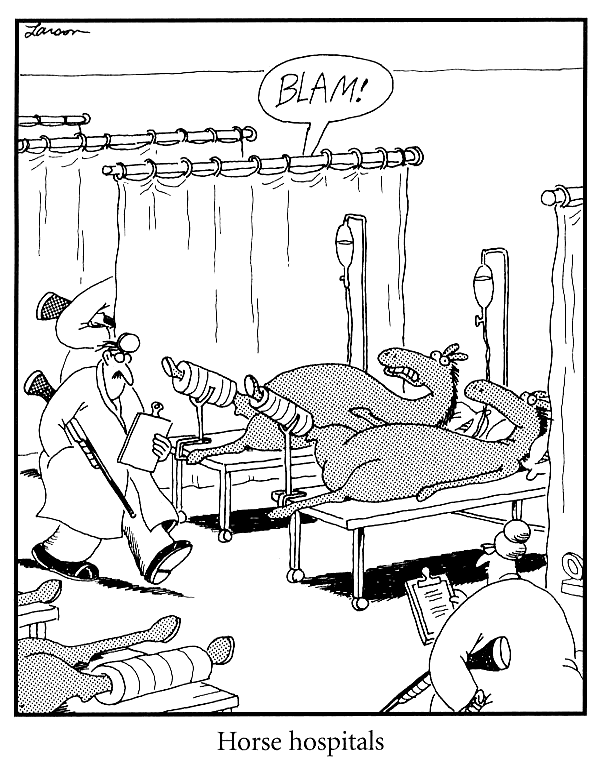Wait what’s the deal with the horses? I want to feel good about myself today.
Edit: Wow, those bastards have it rough.
Their genetics have sacrificed nearly every aspect of basic resiliency for maximum speed on the plains. Most of the work caring for horses is keeping them from accidentally killing themselves. Full disclosure: I worked as a stable hand as a child in exchange for riding lessons. Will never ever own a horse.
Same for rabbits. The are basically as much lean muscle that can fit on the lighest possible skeleton.
If you pick up a rabbit wrong, they can snap their own back with the momentum from kicking their back legs.
I did this too and will also never own a horse lmao. This is why horse people are weird.
Some people love caring for fragile things. Boosts their self-esteem. It can also break them when they fail.
What preditor was so fast horses had to evolve to that extent??
Big cat. You’re aware of the cheetah? Just picture that but not in Africa
You know what really caught me up: where are horses native to?
PBS Eons has a couple good videos on both horse evolution and domestication.
It’s just a damn good series in general as well
There are wild horses on the Mongolian steppes.
All other horses are domesticated. Even the free horses in USA and Australia are descendants of domesticated horses.
You’re right! But also, horses were native to North America but they went extinct 10,000 years ago and weren’t introduced until much more recently.
Equus simplicidens lived around 4 million years ago in North America, relying on speed, stamina, and herd behavior for protection from predators like early wolves and big cats. Their survival, much like modern equids, depended on strong social structures and collective awareness. Over time, this lineage spread to other continents via land bridges before becoming extinct in North America. evolved into the distinct species of horses, zebras, and donkeys and where reintroduced into the American continent by humans
-chatgpt + edits
ChatGPT? Then everyone should assume this is horse shit until verified.
Equus simplicidens, also known as the Hagerman horse, lived around 4 million years ago in North America and is considered an ancestor of modern horses, zebras, and donkeys[3][5]. These animals relied on speed, stamina, and herd behavior for protection against predators such as early wolves and big cats[3]. Their survival was supported by strong social structures and collective awareness[3]. Over time, Equus species migrated to other continents via land bridges[4]. They eventually went extinct in North America around 10,000 years ago during the Pleistocene extinction event[1][2][4]. Horses were later reintroduced to the continent by humans in the late 15th century[4].
Citations: [1] POST-PLEISTOCENE HORSES (EQUUS) FROM MÉXICO https://meridian.allenpress.com/tjs/article/74/1/Article 5/487323/POST-PLEISTOCENE-HORSES-EQUUS-FROM-MEXICO [2] Horses in North America: A Comeback Story | Blog | Nature - PBS https://www.pbs.org/wnet/nature/blog/american-horses-horses-in-north-america-a-comeback-story/ [3] The Hagerman Horse (Equus simplicidens) - National Park Service https://www.nps.gov/articles/000/equus_simplicidens.htm [4] Wild Horses as Native North American Wildlife https://awionline.org/content/wild-horses-native-north-american-wildlife [5] Park Archives: Hagerman Fossil Beds National Monument https://npshistory.com/publications/hafo/index.htm [6] American Zebra (Equus simplicidens) - iNaturalist https://www.inaturalist.org/taxa/317782-Equus-simplicidens [7] Hagerman Horse - Start Packing Idaho https://www.startpackingidaho.com/blog/hagerman-horse/
My teachers used to say the same about Wikipedia.
I did edit heavily, this is 3 outputs combined including a fact check this using Wikipedia
It does not fail on such basic questions, “fact check this:” in a new instance works more reliably then asking a human.
Us. They basically tried to beat pursuit predation by outrunning the distance humans will be willing to track over.
It did not work, they went extinct in North America because of how much it did not work.
Large predatory flightless birds probably didn’t help either.
Ah, sweet home Caelid
“What are those? I know predatory and flightless birds, but both?”
I have looked it up before posting, I learned something new today.
They are known as terror birds. Think of a ten foot tall ostrich with a flesh tearing beak like an eagle.
Saber toothed tigers and shit
Saber toothed shit is a serious reason
Human. Not for food, but because they always choose to breed on the Porcshe over the Toyota Hilux for racing.
The wording here makes it sound like we hunted horses for the specific purpose of having sex on them, and honestly, I’d probably be running as fast as a car if that kept happening to me too!
Basically a 900LB Cocker Spaniel that’s afraid of it’s own farts and will eventually kill every single tree within reach. I also will never own horses.
i mean if i haven’t kept the best diet for a couple days i’m afraid of my own farts too
Sometimes they will die because they can’t puke. Also broken legs are usually fatal even with vet care.
To add on why broken legs are fatal: its because horses are so big, that even with a sling, they cannot support themselves well on 3 legs. And lying down is also not an option as their own weight will crush their internal organs if they stay down for too long.
Also their blood gets pumped through their hooves, and to much weight on one hoof can impede blood flow through their body.
Also, don’t they need to run to move food through their digestive tract? Or to force themselves to cough if they have something stuck in their lungs? I think there is some sort of dependency of basic functions that relies on the movement of their lungs/stomach going back and forth while running that they can’t easily do if they just stand in one place all day
I thought horses not being able to lie down for long was just competition horses! It’s all of them?
It’s not just horses, all large mammals have this problem from lying down too long. Horses can and do lie down every day, but for short periods of time. It’s the extended lying down from illness or injury that kills them.
do humans count as large mammals? pretty sure we have at least very similar problems if we lie down for ages, hence why people who are bed bound have to be moved around regularly.
You mean bedsores, yeah its a pretty similar cause. The difference is that bedsores only cause damage to the skin from lack of blood flow caused by the extended pressure from lying down. While in horses, the extended pressure from lying down leads to poor blood flow in not just the skin, but the muscles and organs nearby too.
And yes, you can turn horses over too, but it takes multiple people and is really dangerous to everyone involved, so its not an action to be taken lightly.
Oh, wow, I had always thought that shooting a horse with a broken leg was an act of brutal expedience, not mercy.
It’s sad, but it’s common medical practice in modern horse hospitals:

The term healthy as a horse is mostly survivorship bias
From what i read here there’s no unhealthy horse, it’s either healthy or dead.
They only have 4 toes total.
And they run around at 60mph on the tips of their toenails.
Humans have multiple toes because our ape ancestors used their toes like fingers. Having multiple, separate toes is probably bad for survival unless you’re using toes to manipulate tools.
Animals that have distinct toes include apes, geckos, mice, raccoons and similar animals which need them to grip onto surfaces or to manipulate things. There are predators which have separate toes because they’re a place to mount claws: eagles, cats, etc. There are animals that have separate toes with webbing between for swimming. But, for a lot of animals, separate toes aren’t really useful, so they’ve evolved away: elephants, rhinos, giraffes, horses, cows, etc.
Yeah, but at least most of those still have multiple toes to spread the weight around. Horses decided to get rid of that completely.
Spreading the weight around using toes doesn’t seem to be a useful strategy. It’s also not something that humans do. Human toes are not at the weight-bearing part of the foot. And, while I’m sure toes are somewhat involved in agility, having individual toes doesn’t seem to be. In fact, if you look at apes like gorillas and chimps, it’s pretty clear that our toes have been getting shorter and less important as we’ve been evolving as upright-walking creatures who don’t live in trees. Instead, the sole of the foot, which used to be much more like the palm of a hand, has been getting longer and sturdier.
If you have separate toes, you have multiple fragile things that can break or be torn off. If you have one mega-toe it’s going to be sturdy. That’s probably why the heaviest animals have the fewest / smallest toes.
As someone who goes barefoot whenever possible, i can tell you that the idea of toes not being particularly useful for agility is very incorrect. If i have to restrict my toes i feel like dogs do when you put booties on their paws, so incredibly clumsy.
The toes play a large part in keeping your balance, making minor corrections to your weight distribution, and especially the big toe is pretty significant when pushing off the ground.
Try walking (or even running) around with your toes lifted off the ground, it’s very awkward.The problem is that a lot of people these days are constantly wearing shoes that make their toes useless, and even when not wearing such shoes their toes have been squeezed into a pointy shape (bunions are almost entirely caused by this) and become weak from atrophy. A healthy foot has toes splayed quite wide and the toes will be pretty strong and probably a lot thicker than you’re used to, look at baby feet for a rough example.
I mostly go barefoot too, and the shoes I have are “barefoot shoes” that have extremely thin soles. But, I still don’t think the individual toes are that important to grip. Sure, the toe pads are important. If you’re moving on the balls of your feet, I’d guess maybe 30% of your weight is in your toes. But, I don’t think I’m getting much contribution to agility from my baby toe being splayed out. If I glued my toes together, I think it wouldn’t hurt my agility much, and it would mean I’m much less likely to catch that individual, fragile baby toe on a corner.
Tbh if I could I think I would turn on the gene for prehensile feet.
Just to try. Looks fun.
you can train your feet to be pretty prehensile, there are people who paint and write with their feet.
Oh yeah I pick up stuff with them sometimes but I wanna try the monkey experience lol
We’re God’s creation but God is a lazy kid that rushed the science project for the whole semester in six days and barely half assed it hoping no one digs too deep into it
as long as you ditch the whole “omniscient and omnipotent” part, god is pretty relatable.
i’d like to see you do better when you’re literally creating the fucking universe on your own.
Well let me pull out of the drawer my really dusty degree in Biology and let’s see.
First of all, do I still have to follow the principles of Embriology or do I get to make it from scratch? Because that’s where I reckon most of the problems that came up come from
you can do precisely whatever you want, but you have to personally compute every single interaction, you are THE game master of EVERYTHING, ALL the time, FOREVER.
frankly the fact that we have sensible physics all the way down to quarks is pretty impressive, i struggle to make a sensible day dream in my head. Put me in charge of a universe and you have something somehow worse than the fey wilds.
imagine having a stuffy nose and you can’t breathe with your mouth.
wait yeah no we wouldnt be able to play like, any wind instruments, traditionally at least.
I always thought the fact that turning our heads too fast can give us strokes was rather inconvenient.
Yikes. That’s why I get a little worried about the high velocity neck stuff that some chiropractors do.
Or that sneesing / trying to hold back a sneeze can give you an aneurism. But I guess although it’s rare in animals it’s not exclusive to humans.
Rupture an existing one, right?
Waiting both sneezing or trying to hold back is dangerous? What are we supposed to do half-ass it?
Horses not breathing while running opened a whole new world of anxiety for me.
What?!
They don’t aspirate when they run, their organs slosh around and just sort of push their lungs enough to keep them alive.
Its only a valve. Topologically speaking, the passage from the mouth to the anus only constitutes one hole.
The passage of air into the lungs is not a hole however, that is a cavity. Same difference with the vagina, that’s not a hole, that’s a cavity.
People are donuts!
No, since you have a nose. Topologically, people have 3 holes.
7, if the cut-off is 60 microns (tear ducts). Smaller than that, we’re essentially Swiss cheese.
The teeth thing is just because of our high sugar, high grain diet
The first* people with bad dental health were Egyptians as they lived on bread (which packs your teeth and feeds the bacteria that ferment it and make acid) before that, and until the invention spread, people died of old age with all their teeth intact
I eat very low carb - almost entirely meat due to allergies, and haven’t had a cavity since I started doing that, despite me nearly never brushing or flossing my teeth
*There were also people who lived in the tropics and ate a lot of fruit, and those with sugar cane.
Brush your teeth bud. People can probably smell your breath from a mile away.
You’d think. But where does the bad smell come from?
My understanding is it’s from overactive bacteria; I don’t feed my mouth bacteria with food that makes them smell
At least my partner still kisses me
Some people get off on eating ass
You never brush your teeth? It’s not only good for health dude
I thought Egyptians had bad teeth because their flour was ground with sandstone, leaving sand in their bread. They ground their teeth into nothing by eating sand.
I feel like the sand thing was a guess by people who couldn’t pick why ancient Egyptians had worse teeth than everyone else in the ancient world
If there’s sand in your food you notice and it feels bad. It’s not something that makes you go “oh well I’ll just keep chomping” and that would wear teeth down, not give them abscesses
Dolphins probably lament not being able to make milk come out of their buddy’s nose by making them laugh while drinking.
Tbf, our teeth aren’t bad. They just didn’t evolve to consume so much sugar.
They just didn’t evolve to consume so much sugar.
Bro, eating oranges puts our tooth enamel in a weakened state. If we were designed, it was by an idiot.
Oranges do not naturally have that much sugar.
It’s not the sugar, but the acid that our teeth can’t handle.
The fact that healthy foods can’t be consumed without a risk of harm is not an intelligent design.
I mean, even apples (i.e. “Garden of Eden”) can promote the growth of plaque!
Half our expected lifetime was our expected lifetime back when they evolved. Teeth are doing quite well, all things considered.
Actually a bigger contributor is underdeveloped jaws due to no longer requiring to chew from.a very young age for nutritional requirements.
Why would stronger Jaws prevent teeth decay?
From an evolutionary standpoint we just have to survive long enough to reproduce, if we can’t eat past age of reproduction there’s no evolutionary pressure to change that.
Thank goodness for modern dentistry.
Generally sure. We’ve certainly evolved to want to be around for a while after reproduction though, for example human infants are completely worthless. That doesn’t mean we need to be top notch, but we do need to exist sufficiently to get children to even the most brutal, basic independence.
Compare that to something that hatches then is already just adulting, like many reptiles.
I think the keyword is precocial vs altricial
Especially considering how reliant we humans are on knowledge, without the previous generation teaching us we’re pretty well doomed.
Old people would have been highly valued just because they’re sitting on decades of knowledge and wisdom, in an age without permanent records of information grandma would have been the only source of information about the past, and would presumably spend most of their time just sharing that knowledge with everyone else.
That’s completely untrue.
Evolution applies to the entire lifespan — if we could “reproduce” but died in childbirth every time, our species would have gone extinct long ago.
Parents and grandparents also contribute greatly to the success of a child long long after they’re born, helping to ensure it also survives to reproductive age.
“grandparents”
Life expectancy in 18th century France was in the 20s, grandparents are optional
[Edit : It turns out people have said the same thing while I was looking for the right source to confirm my point, so I guess this comment’s a bit redundant now. Still leaving it in case someone’s interested]
Child mortality The most significant difference between historical mortality rates and modern figures is that child and infant mortality was so high in pre-industrial times; before the introduction of vaccination, water treatment, and other medical knowledge or technologies, women would have around seven children throughout their lifetime, but around half of these would not make it to adulthood. Accurate, historical figures for infant mortality are difficult to ascertain, as it was so prevalent, it took place in the home, and was rarely recorded in censuses; however, figures from this source suggest that the rate was around 300 deaths per 1,000 live births in some years, meaning that almost one in three infants did not make it to their first birthday in certain periods. For those who survived to adolescence, they could expect to live into their forties or fifties on average.
So reaching 50 wasn’t too rare for someone who had survived childhood, and given how people often started having children younger then, that was well enough to be grandparent. Doesn’t mean everyone would’ve gotten to known their grandparents, but it wouldn’t have been super rare either.
If you make past childhood for most of history outside of places experiencing plagues, major famines, or wars, you had a good shot of making it to your 70s
https://en.wikipedia.org/wiki/Life_expectancy#Life_expectancy_vs._other_measures_of_longevity
A reminder that life expectancy in ancient history was so low not because people generally croaked by 40, but because of how many children died young.
It’s an average, not a maximum. People regularly lived into their 70s and 80s hundreds of years ago.
From what i’ve read and heard about the subject, the life expectancy generally looked something like this back in the hunter-gatherer days:
You were very likely to die as an infant, pretty likely to die before puberty, after that you were likely to make it to 40-50, and it wasn’t that rare to reach 70.
I don’t disagree with your overall point, but statistics like that are almost always heavily skewed because of high infant mortality rates
18th century france is also quite possibly the single worst place and point in time to use as a comparison, there’s a reason people beheaded monarchs.
That was an evolutionarily insignificant time period.
Horses were at least marginally less ridiculous before people got involved. Not quite to the same extent as dogs, but compare a steppe horse with a thoroughbred and you’ll see that they’re smaller and hardier. Much better equipped to live, slightly less able to carry fully armored people on their back.
I am 99% sure humans are supposed to have tails
Tails aren’t particularly common on great apes

















